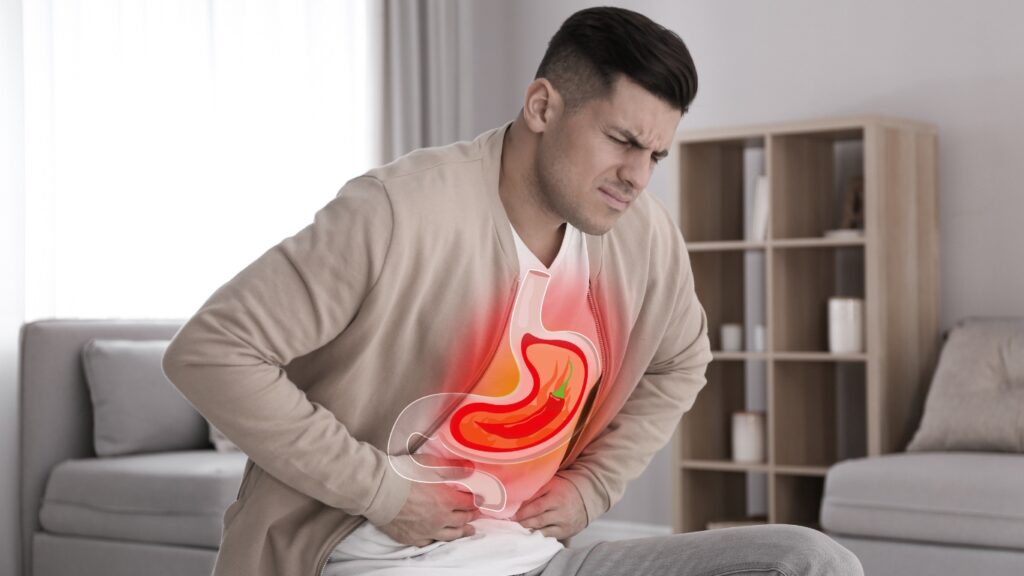
Hot weather often influences digestive ability and immunity. This might include loss of appetite on hot days, dehydration, or a heat-related illness such as heat stroke or heat exhaustion. Apart from this, hot weather accelerates food spoilage and the growth of bacteria. This means disease-causing bacteria are growing well and the incidence of foodborne illnesses is on the rise.
Heat-related stomach disorders can arise due to several factors such as dehydration, electrolyte imbalance, and changes in digestion and metabolism. Here are some common heat-related stomach disorders:
Heat Exhaustion, Dehydration, and Heat Stroke: Heat exhaustion and dehydration are significant health risks during the summer months. Though these are not directly stomach disorders, they heavily impact the digestive system. Heat exhaustion occurs when the body overheats, often due to prolonged exposure to high temperatures or strenuous physical activity. Heat exhaustion usually occurs due to severe dehydration. Symptoms of heat exhaustion are nausea, vomiting, diarrhea, and stomach cramps.
It can result from loss of fluids and electrolytes through excessive sweating, insufficient fluid intake, or both. If heat exhaustion is not treated it can progress to heat stroke, a life-threatening condition. To prevent dehydration and heat exhaustion drink plenty of fluids, consume electrolyte-rich drinks, and rest in a cool environment.
Heat-Induced Gastroenteritis: Heat-induced gastritis is a condition where the lining of the stomach becomes inflamed. This can happen due to the stress and dehydration associated with high temperatures or bacterial growth due to unhygienic conditions and improperly stored food, particularly in hot weather. During the summer months, prolonged exposure to heat and inadequate fluid intake can lead to dehydration, which in turn reduces blood flow to the stomach lining and impairs its ability to protect itself from gastric acids.
This can result in symptoms such as abdominal pain, nausea, vomiting, bloating, and a burning sensation in the stomach. Also, the body’s response to heat stress can increase the production of stomach acid, further irritating the stomach lining. Preventing heat-induced gastritis involves staying well-hydrated and avoiding excessive consumption of alcohol and caffeinated beverages, which can cause dehydration, and eating smaller, more frequent meals to reduce the strain on the stomach.
It is also helpful to avoid spicy and acidic foods that can irritate the stomach lining. Recognizing the signs of heat-induced gastritis early and taking steps to stay cool and hydrated can help mitigate the discomfort and potential complications.
Irritable Bowel Syndrome (IBS) Exacerbation: Irritable Bowel Syndrome (IBS) can be particularly challenging to manage during hot summers. High temperatures often exacerbate the symptoms of IBS, such as abdominal pain, bloating, and irregular bowel movements. Heat can cause dehydration, which in turn affects digestion and can lead to constipation or diarrhea. The stress and discomfort associated with extreme heat can increase the severity of IBS symptoms. Individuals with IBS must stay well-hydrated, avoid triggering foods, and eat a balanced and nutritious diet.
They must manage stress effectively during the summer months. Wearing loose, comfortable clothing and finding ways to stay cool, such as staying in cooler environments, can also help alleviate some of the discomfort associated with IBS in hot weather.
Food Poisoning: Food poisoning is particularly prevalent during the summer months due to the increased temperatures and eating out and getting meals delivered. Bacteria thrive in warm environments and multiply into millions in a few hours. Social events and food deliveries involving perishable foods like meats, dairy products, and salads can quickly become unsafe if not handled and stored properly.
Frequent opening of refrigerators and power outages often bring the food to higher temperatures, supporting the growth of food-poisoning bacteria. The handling of food in less controlled settings can lead to contamination. Symptoms involve abdominal pain, nausea, vomiting, and diarrhea. To reduce the risk of food poisoning, it is essential to keep food at safe temperatures, practice good hygiene, and ensure proper cooking and storage methods during summer gatherings.
Gastroesophageal Reflux Disease (GERD): Gastroesophageal reflux disease (GERD) as the name suggests is a stomach disorder in which stomach acid flows back to the mouth. It can be particularly troublesome during the summer months. Symptoms include Heartburn, chest pain, nausea, and stomach acidity. The heat and outdoor activities often lead to changes in diet and lifestyle that can exacerbate symptoms. People tend to consume more cold, carbonated beverages, and spicy and fried foods due to heat and vacation, which can trigger acid reflux.
Additionally, the high temperatures can lead to dehydration, which thickens the stomach acid, increasing the likelihood of reflux. Activities like swimming and lying down immediately after eating can also worsen symptoms. To manage GERD in summer, it is essential to stay hydrated, avoid trigger foods, eat smaller meals, and refrain from lying down right after eating. Adopting these habits can help minimize discomfort and keep GERD under control during the hot season.

Tips to Prevent Heat-Related Stomach Disorders:
- Hydration: Drink plenty of water and electrolyte solutions, especially when sweating heavily. Coconut water, aam panna, shikanji, chaach, kokum sharbat are great drinks for summer. Well well-hydrated body in summer is capable of handling most heat-related issues.
- Food Safety: Keep food properly refrigerated, avoid leaving food out in the heat, and practice good hygiene. Avoid eating too much outside food. If you eat make sure you eat at a hygienic place. Do not overindulge in restaurant food during vacations.
- Moderate Activity: Avoid strenuous activities during the hottest parts of the day. Exercise lightly during morning or evening hours. Try going for at least half an hour’s walk every day.
- Stay Cool: Wear light clothing to help keep the body cool. Seek shade as far as possible whenever outdoors. Use curtains, fans, coolers, or air conditioning to keep indoors cool.
- Balanced Diet: Eat light, easily digestible foods, and avoid heavy, greasy meals. Balance occasional heavy meals with fiber-rich foods like fruits and salads for good digestion. Include papaya, bel fruit, and coconut water in your diet. Avoid fast food and processed food as much as possible.
- Add Probiotics: Dahi, yogurt, lassi, chaach, and other fermented foods are great for boosting your digestive health this summer by providing good gut bacteria.
If you experience severe symptoms or suspect heat stroke, seek immediate medical attention.